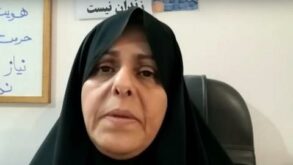OHCHR – United Nations human rights experts* have repeated their urgent call to Iran to annul the death sentence against Iranian academic Ahmadreza Djalali amid reports that his latest legal attempt to challenge the sentence has been rejected.
“We urgently call on Iran to lift the death sentence imposed on Dr. Djalali, as the State has apparently not complied with its international obligations to give him a fair trial and the right to appeal,” the experts said in a joint statement released in Geneva.
“We are deeply disturbed by reports from Dr. Djalali’s legal team that his application for judicial review of the death sentence has been dismissed by the Supreme Court, apparently without any review process or explanation. This contravenes Iran’s obligations under international law and we strongly condemn it.
“We also profoundly regret that the authorities have disregarded our earlier call to bring this trial into line with international standards,” they added.
“We urge the authorities to annul the death sentence against Dr. Djalali and to release him.”
The death penalty violates human dignity, they added, and may amount to cruel, inhuman or degrading treatment or punishment.
Dr. Djalali, a lecturer, medical doctor and researcher in disaster medicine who is a resident of Sweden, was detained in April 2016. The UN experts believe the violations of his rights to due process and a fair trial have included incommunicado detention, denial of access to a lawyer, and forced confession. Dr. Djalali was sentenced to death on 21 October 2017. Information received indicates that he was not given a meaningful opportunity to appeal against his conviction.
The UN Working Group on Arbitrary Detention has previously called for Dr. Djalali’s immediate release and for him to be accorded the right to compensation and other reparations, after finding his deprivation of liberty was arbitrary and breached the Universal Declaration of Human Rights and the International Covenant on Civil and Political Rights, including his rights to effectively challenge the legality of detention, to a fair trial and to an effective defence.
UN experts have previously raised their concerns about Dr. Djalali’s case directly with the Iranian authorities, including in a communication issued in February 2017. At the time the Government responded noting that Dr. Djalali had been charged with “corruption on the earth” and had been allowed meetings with his lawyers and phone calls with his family. In November 2017, experts expressed grave concern at the death sentence handed down to Dr. Djalali. On that occasion, the Government chose not to respond.
ENDS
*The UN experts: Mr. José Antonio Guevara Bermúdez, current Chair-Rapporteur of the Working Group on Arbitrary Detention, Mr. Nils Melzer, Special Rapporteur on torture and other cruel, inhuman or degrading treatment or punishment, Ms. Agnes Callamard, Special Rapporteur on extrajudicial, summary or arbitrary executions, Ms. Asma Jahangir, Special Rapporteur on the situation of human rights in the Islamic Republic of Iran.
The Special Rapporteurs and Working Groups are part of what is known as the Special Procedures of the Human Rights Council. Special Procedures, the largest body of independent experts in the UN Human Rights system, is the general name of the Council’s independent fact-finding and monitoring mechanisms that address either specific country situations or thematic issues in all parts of the world. Special Procedures’ experts work on a voluntary basis; they are not UN staff and do not receive a salary for their work. They are independent from any government or organization and serve in their individual capacity.
UN Human Rights, Country Page: Iran
For more information and media requests, please contact Margarita Nechaeva (+41 229289462 / [email protected])
For media inquiries related to other UN independent experts please contact
Jeremy Laurence, UN Human Rights – Media Unit (+41 22 917 9383 / [email protected])
This year, 2018, is the 70th anniversary of the Universal Declaration of Human Rights, adopted by the UN on 10 December 1948. The Universal Declaration – translated into a world record 500 languages – is rooted in the principle that “all human beings are born free and equal in dignity and rights.” It remains relevant to everyone, every day. In honour of the 70th anniversary of this extraordinarily influential document, and to prevent its vital principles from being eroded, we are urging people everywhere to Stand Up for Human Rights: www.standup4humanrights.org.
 Shabtabnews In this dark night, I have lost my way – Arise from a corner, oh you the star of guidance.
Shabtabnews In this dark night, I have lost my way – Arise from a corner, oh you the star of guidance.


